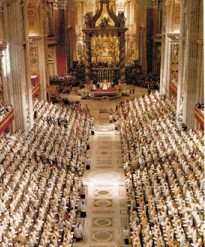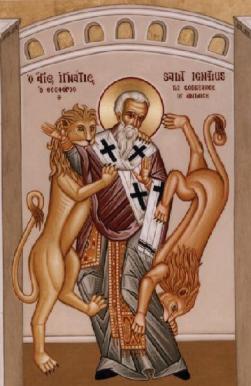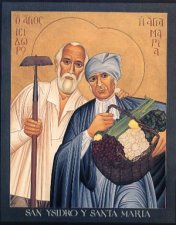Friday Frivolity: Church Hospitality
Who says Christians are cold, elitist and unwelcoming?
"We are travellers…not yet in our native land" – St. Augustine
Who says Christians are cold, elitist and unwelcoming?
 At the moment I’m reading through the documents of the Second Vatican Council in preparation for what we will be covering in the JP2 Group towards the end of the year. I thought it would make sense to do a few blog posts about what I’ve been reading.
At the moment I’m reading through the documents of the Second Vatican Council in preparation for what we will be covering in the JP2 Group towards the end of the year. I thought it would make sense to do a few blog posts about what I’ve been reading.
The Second Vatican Council is probably one of the most misunderstood and misrepresented Councils of Church history, together with the Council of Nicea and the Council of Trent.
I can’t think of Vatican 2 without remembering an incident that happened back in England when I was a member of our church’s hospital visiting ministry. Each week, two members of our group would go to the local hospital and visit all those patients who had written down “Roman Catholic” on their admission forms. We would visit each of them, offer them something to read and check to see if they wanted to receive Holy Communion the following day. It was a large campus and it took us several hours to cover the entire hospital.
Happy Friday! I don’t know about you, but for me this week has simply flown by. It’s now only a few hours until it’s time to hit the beach, but to get you through those remaining hours, here’s a little bit of Friday Frivolity….
“And if you’re Catholic, there are even more…” 😀
Oh, and for those ladies looking for a new Bible, I can thoroughly recommend the new RSV New Testament Study Bible which has commentary from Dr. Scott Hahn and Curtis Mitch 🙂
 This is the first entry in what I hope to be a regular series of posts about the Early Church Fathers.
This is the first entry in what I hope to be a regular series of posts about the Early Church Fathers.
It is a good thing to study the Early Fathers because by reading their writings we can get a better picture of what the Church looked like during those early centuries, both during the years of persecution and the years of peace.
The Church Fathers speak to us of the Faith they learned from the Apostles and from their immediate successors. If we would sit and listen, their words can still instruct and inspire us today, just as they did for Christians under their care in their own time.
I would like to begin this series of entries with my favourite Early Church Father, the inspirational martyr and gifted writer, St. Ignatius of Antioch.
“Blessed is the man who perseveres under trial, because when he has stood the test, he will receive the crown of life that God has promised to those who love him.”
– James 1:12
My posts on the Fathers will not normally be this long, but reading St. Ignatius for the first time had some a profound effect on me I want to try and do him justice. Read to the end, it’ll be worth it, I promise.
 Today I’m going to cheat a bit.
Today I’m going to cheat a bit.
Shocking, I know…
I’m in the middle of writing several other blog entries at the moment, so rather than spending time writing a brand-new entry for this Sunday’s Gospel, I’m going to recycle something I wrote a few years ago.
The Gospel in this Sunday’s Lectionary continues on from last week in Luke’s Gospel:
Jesus was praying in a certain place, and when he had finished,one of his disciples said to him,”Lord, teach us to pray just as John taught his disciples.”
He said to them, “When you pray, say:Father, hallowed be your name,your kingdom come.Give us each day our daily breadand forgive us our sinsfor we ourselves forgive everyone in debt to us,and do not subject us to the final test.”
And he said to them, “Suppose one of you has a friendto whom he goes at midnight and says,’Friend, lend me three loaves of bread,for a friend of mine has arrived at my house from a journeyand I have nothing to offer him,’and he says in reply from within,’Do not bother me; the door has already been lockedand my children and I are already in bed. I cannot get up to give you anything.’I tell you,if he does not get up to give the visitor the loavesbecause of their friendship,he will get up to give him whatever he needsbecause of his persistence.
“And I tell you, ask and you will receive;seek and you will find;knock and the door will be opened to you. For everyone who asks, receives;and the one who seeks, finds;and to the one who knocks, the door will be opened.
What father among you would hand his son a snakewhen he asks for a fish? Or hand him a scorpion when he asks for an egg? If you then, who are wicked,know how to give good gifts to your children,how much more will the Father in heavengive the Holy Spirit to those who ask him?” – Luke 11:1-13
Below is a reflection I gave on this same passage at a “Cheltenham In Prayer” service back in 2004…

 I would now like to share with you what I regard as one of the best kept secrets in Catholicism, a group of men called the “Early Church Fathers”.
I would now like to share with you what I regard as one of the best kept secrets in Catholicism, a group of men called the “Early Church Fathers”.
I myself only discovered the Fathers about ten months ago. Despite going to Mass each week of my entire life (that’s approximately 1,534 sermons), going to Catholic school for six years, and taking part in adult formation throughout my twenties, I can never remember any of these men being discussed or even mentioned with the exception of St. Augustine and, even then, he was only mentioned in passing.
 I’m currently in the middle of writing an introductory post about the “Early Church Fathers” and I came across a wonderful quotation from one of my favourite Fathers, the great preacher, St. John Chrysostom:
I’m currently in the middle of writing an introductory post about the “Early Church Fathers” and I came across a wonderful quotation from one of my favourite Fathers, the great preacher, St. John Chrysostom:
“An intelligent, discreet, and pious young woman is worth more than all the money in the world. Tell her that you love her more than your own life, because this present life is nothing, and that your only hope is that the two of you pass through this life in such a way that, in the world to come, you will be united in perfect love” – St. John Chyrsostom
Wonderful stuff! But how exactly does one find this woman?! Unfortunately, this amazing preacher and Father of the Church does not tell us! Do not fear! I have stepped into the breach and have compiled my definitive list of the “Top Ten, All Time, Catholic Pick-Up Lines”!
Please feel to add your own suggestions in the comments 😀
Part 1 | Part 2